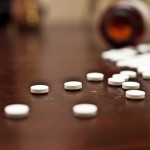 The current obesity epidemic has increased the popularity of artificial sweeteners and the food manufacturers have not been slow to expand their use. In particular, the popularity of aspartame (L-α-aspartyl-L-phenylalanine methyl ester) sweetened beverages has increased in recent decades. Aspartame is also now starting to appear alongside caloric sweeteners in products that do not fit into the typical ‘diet’ category. Since aspartame was first approved for use in food in 1981, concerns have been raised over possible deleterious health effects, and these concerns have increased as aspartame permeates into the food chain further. This surreptitious spread of aspartame into the human diet is worrying because often consumers are unaware that they are ingesting the product. The neurological effects of aspartame have been widely reported, although no definite mechanisms of action has been elucidated thus far. However, just as worrying is the possibility that aspartame consumption may be associated with an increased risk of certain types of cancer.
The current obesity epidemic has increased the popularity of artificial sweeteners and the food manufacturers have not been slow to expand their use. In particular, the popularity of aspartame (L-α-aspartyl-L-phenylalanine methyl ester) sweetened beverages has increased in recent decades. Aspartame is also now starting to appear alongside caloric sweeteners in products that do not fit into the typical ‘diet’ category. Since aspartame was first approved for use in food in 1981, concerns have been raised over possible deleterious health effects, and these concerns have increased as aspartame permeates into the food chain further. This surreptitious spread of aspartame into the human diet is worrying because often consumers are unaware that they are ingesting the product. The neurological effects of aspartame have been widely reported, although no definite mechanisms of action has been elucidated thus far. However, just as worrying is the possibility that aspartame consumption may be associated with an increased risk of certain types of cancer.
For example, recent a study1 investigated cancer and soft drink consumption from the Nurses Health Study (NHS) and Health Professional Follow-up Study (HPFS). The authors reported an increased risk of leukemia with a higher consumption of sugar sweetened or artificially sweetened soft drinks amongst the study participants. In addition, when the data for male subjects was analysed in isolation, there was a significant increase in the relative risk of non-hodgkin lymphoma (RR = 1.31) and multiple lymphomas (RR = 2.02) for men consuming more than one diet soft drink per day. As usual the scientists were non-committal and careful to play down the implications of the findings, even suggesting in the conclusion that the associations could be due to chance despite reaching statistical significance. Ascribing cause and effect is not possible from this data when taken in isolation because of its design. However, put into context with previous animal experiments, this data suggests that aspartame may cause cancer.
Long-term experiments investigating brain tumours in rats suggest that aspartame is carcinogenic. Further, recent evaluations of aspartame in rats at doses below or equivalent to those currently considered safe in humans resulted in increased lymphomas and leukemias, and the deleterious effects showed a dose response. In liquids, aspartame is unstable and is known to break down at room temperature or above to its component parts, aspartic acid, methanol and phenylalanine. This is problematic because methanol if ingested is then metabolised in humans to the compound formaldehyde, which is a known carcinogen. Although many claim the literature shows inconsistent results regarding the deleterious effects of aspartame, the limited scope of many of the studies has brought into question the fortitude of scientists to investigate the issue with relevant studies. In particular, studies are lacking because they do not assess multiple time points for exposure to aspartame which limits their usefulness.
The increased risk of lymphomas in men consuming higher intakes of diet soft drinks may be due to the increased enzymatic concentrations of alcohol dehydrogenase type 1 (ADH1) in men compared to women. In men, increased activity of the ADH1 enzyme system may increase conversion of methanol to formaldehyde. This hypothesis is supported by data (from the same study as above) showing that those men in the highest groupings for cancer were also in the lowest grouping for ethanol intake. This may relate to the ability of regular ethanol consumption to inhibit the ADH1 enzyme system competitively, thus slowing the conversion of methanol to formaldehyde. Therefore men with lower intakes of ethanol may have higher concentrations of unbound ADH1 and therefore faster conversion rates for methanol to formaldehyde. The lower concentrations of ADH1 in women may slow this reaction and thus impeded the production of the carcinogenic formaldehyde somewhat.
